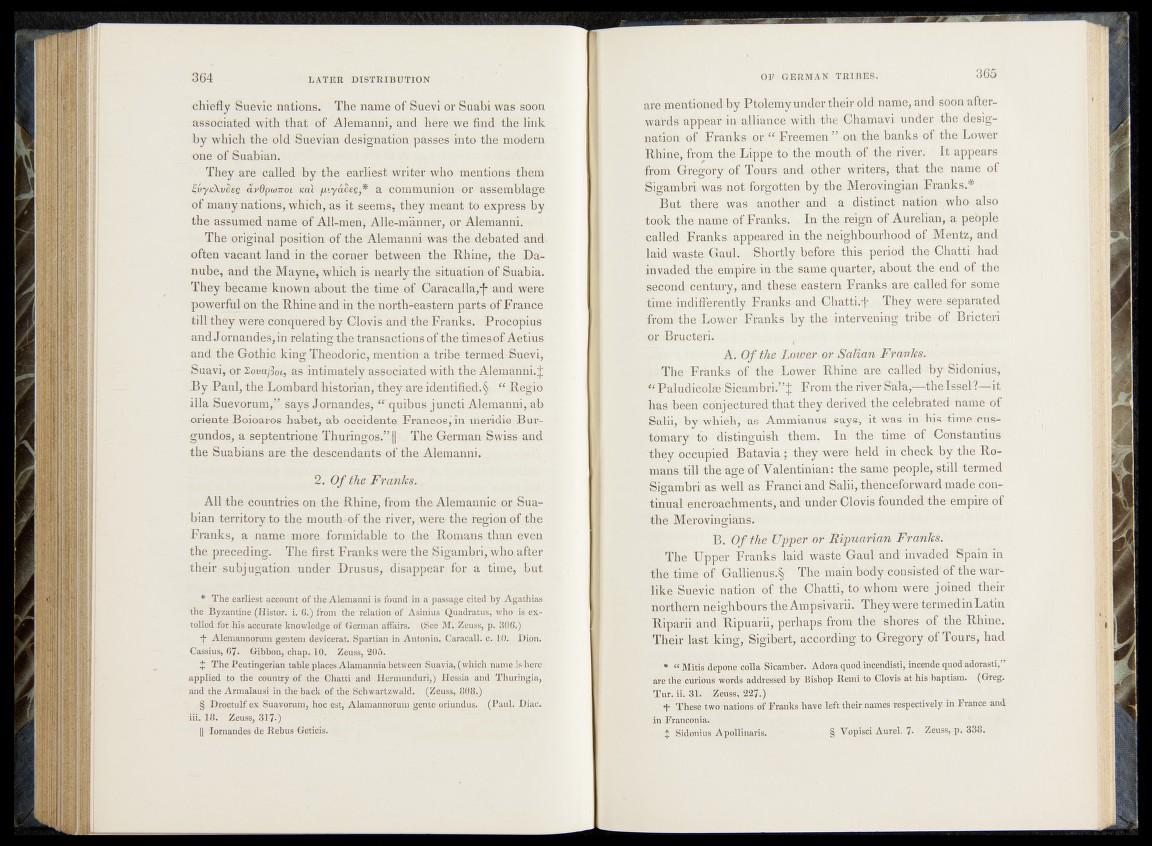
chiefly Stievic nations, " The name of Saevi or Suabi was-soon
associated with that of Alemanm/and h ire we find the link
by which the old Suevian designation passes into tho-modern
one of Suabian.
They are called by the earliest!: w rit# who mentions » them
Zvyic\.vSee avOphnroi mi fayadeq* a communion or assemblage
of many nations, which, as it sèems, they meant to express by
the assumed name of All-men, Alle-man ner, or Alemanni.
The original position # the Alemanni was the debated and-
often vacant land in the corner between the Rhine* the Danube,
and the Mayne, which is nearly the-sitnationof Buabia.
They became known about the time of Caracalla /f and were
powerfiil on* the Rhine and in the north-eastern psrtfeilllfrunce.
fill they were conquered by GIdvis and the/Pranfesi Procopius
and Jornandes,in relating the transactions of the times of Aetius
and the Gothic king Theodoric, mcntibn- a tribe termetLfSuevi,
Suavi, or 2o«a/3oi, as intimately associated with the: Aléca4b#. £
By Paul, the Lombard historian, they are identified.§ | Regio
ilia Suevorum/’ says Jcmandes>b quibus juncti Al©ii|a®hi^ab
oriente Boioaros habet, ab occidente Frances,'# meridie Bur-
gundos, a septentrione Thuringos / ’|| The German Swiss and
the Suabians are the descendants of the Alemanni.
2. O f the F ra n k s..
All the countries on the Rhine, front the. Alemannic or Suar
bian territory to the mouth-of the river, ^ e re the lfegion # ^ |^
Franks, a name more formidable to. the Romans than even
the preceding. The first Franks were the Sigambri, who after
their subj ugation under Drusus, disappear for a time, but * §
* The earliest account of the Alemanni is found in a passage cited by Agathias
the Byzantine (Histor. i.6.) from the relation of Asinius Quadratus, who is extolled
for Ms accurate knowledge of German affairs. (See M. Zeuss, p. 306.)
+ Alemannorum gentem devicerat.. Spartian in Antonin. Caracall. c. 10. Dion.
Cassius, 67. Gibbon, chap. 10. Zeuss, 205.
J The Peutingerian table places Alamannia between Syayia, (which name is here
applied to the country of the Chatti and Hermunduri,) Hessia and Thuringia,
and the Armalausi in the back of the Schwartzwald. (Zeuss, 808.) t
§ Droctulf ex Suavorum, hoc est, Alamannorum gente oriundus. (Paul. Diac.
i'ii. 18. Zeuss, 317-)
|| Iornandes de Rebus Geticis.
are .mentionedd>y Ptolemyu>hj#r their old name, and soon afterwards!'
appear- in alliance with thg^hamavi under the designation
o f Franksfeoivb Freemen?/ on,the banks-of the Lower
R-hin%,'from thëtLippë to the mouth of the-river. I t appears
from ^Gregory of vToipSvand--Gibber writers, (that the name of
.was, bv?tb e^iMeroyingian Franks,* ,
- But> fh|ii;o was napqther and- a .^ t i n c t i nation who, also
fools,the name^pf Franks. In th^;rjgâÿ|tf(’®f Aurelian, a pebple
iealied Franks -upjp.eaÿed;,.in the n e igbhour-h qp d iof*, M en tz, and
fad/waste Gaul ^^bbr%ib®forôT,thisv period’- *the Chattrihad
invaded thesemipi'mfimttbessnme quarter^ about the end of* the
-second and,4%^ e § s te rn FrçmksH&f^jcalled.for son#
«tin1 pi mdiifefently-F’-mnks and Ghatt^^ntThgjbwere separated
fromlthe* Lower- Franks, by the ipfpr^^ng; trib e e ^ Bricteri
or, Brgoteri«
A. Of the Lower or SaMiin Frank#.' '
J -The Franks -of the Lower Rhine areMÜdîby Bidoniuss
^PaludiôOl^Bîcambr^-ÿri^Ffnmrihe ri-VBr I'Ssiji-rit
has- Heh^^&ÿMM'red that they derived thejcelebfeted naniè èf
Sabi, by which,'as^Ammianus". says', it wu!S"innMiS'time customary
pto - ■ distinguish them. In \fhe"tiniev of - ConstantiUS
'they occupied-' Batavia, 5 they were held in 'AjÉ^bby ’the Ro-
till the age of Valentiniab; the same people,..still termed
"Sigambri as well as Franci and Salii,'thenceforward made con-
tiaual encroachments, and under Clovis founded thetàfipire of
the Merovingians.
B. Of the Upper or Ripuarian Frantes.
The tTpper* Franks laid w&S'te Gàu’l and5 invâdèfl 'Bpain in
the time of GalliêhuIÇ ’ The main body'Cansiteted''of the Warlike
Buev it nation of the G la tti, td^Whdm were Joined their
northern neighbours the Ampsivarii. They were termed# Latin
Riparii and Ripuarii, perhaps from the .shores pf the Rhine.
Their last king, Sigibert, aceording to Gregory of Tours, had
* a Mitis depone colla Sicamber. A dora quod incendiai, incend-e quodadorasti,”
are the curious words addressed by Bishop Remi to Clovis at his baptism. (Greg.
Tur^ii. 31*. Zeuss, 227.)
+~ These two nations of Franks have left thek names respectively in France and
in Franconia. :
J Sidonius Apollinaris. Vopisd AureL 7- Zeuss, p. 338.